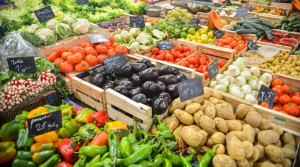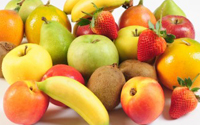8 WAYS TO IMPROVE YOUR DIGESTION
You haven’t gained weight, but your jeans are straining at the waist, or you can’t focus on your to do list due to cramping in your abdominals… sounds like your digestive system needs some help.
Around 40% of people in the UK have at least one digestive symptom at any one time, according to Dr Anton Emmanuel, consultant gastroenterologist at University College Hospital in London[1].
So how can you help your digestive system work efficiently and effectively…
Feed it properly
 “Your digestive system is like a piece of fine machinery. Many different parts work together to process food. In order to get the maximum benefit from your food, make sure the type of food you put into it is the best quality. We want the best digestive system, so use the best fuel! To improve digestive health and maintain it, it is important to eat a balanced and varied diet.
“Your digestive system is like a piece of fine machinery. Many different parts work together to process food. In order to get the maximum benefit from your food, make sure the type of food you put into it is the best quality. We want the best digestive system, so use the best fuel! To improve digestive health and maintain it, it is important to eat a balanced and varied diet.
“Eat vegetables and protein with every meal – vegetables are packed full of nutrients like beta carotene which help your digestive system function properly. Beta carotene gets turned into vitamin A in the body which is an essential nutrient for mucus membranes – like the gastrointestinal tract.
“Protein supports our digestive system by providing amino acids as building blocks for the regeneration of the gastrointestinal tract, so is essential for good gut health. As a general guideline, aim to consume five to six servings a day of the highest-protein plant foods: nuts or seeds, beans or lentils. One or two servings of eggs and dairy per day can be exchanged for a plant protein serving in non-vegans.” explains Shona Wilkinson, Nutritionist at SuperfoodUK.com the online shopping destination for all things health and wellbeing.
Eat more fibre
 “Fibre helps your digestive system function properly adding bulk to your stools and helping to remove toxins. There are two types of fibre, soluble and insoluble. Soluble fibre can be digested by the body and helps relieve constipation by softening stools, making them easier to pass. Good sources of insoluble fibre are: oats, barley, rye, fruit, golden linseed and root vegetables.
“Fibre helps your digestive system function properly adding bulk to your stools and helping to remove toxins. There are two types of fibre, soluble and insoluble. Soluble fibre can be digested by the body and helps relieve constipation by softening stools, making them easier to pass. Good sources of insoluble fibre are: oats, barley, rye, fruit, golden linseed and root vegetables.
“Insoluble fibre cannot be digested and so passes through the digestive tract helping to clear waste and other foods through the digestive system. This helps keep the bowel health and prevents digestive problems. Good sources of insoluble fibre are: bran, cereals, nuts and seeds,” explains Shona.
Address any food allergies or sensitivities
“Food sensitivities are behind many digestive disorders. If you have symptoms such as headaches, migraines, runny eyes, ears or throat, nausea, constipation, diarrhoea, IBS, bloating gas, general weakness and mood swings you may want to find out if you are reacting to certain foods, as if you are it can place a stress on the digestive system.
“A simple way to try to work out what foods you are reacting to is to keep a food diary, making a note of any symptoms you have experienced (such as the ones listed above). If you notice a pattern associated to a certain type of food you may want to remove it from your diet,” explains Shona.
Limit gassy foods
“Certain foods such as beans, pulses and root vegetables are notorious for causing bloating and wind. Although these foods are good for you and are low in fat, try and choose salad vegetables such as salad leaves, and tomatoes, which will not make you so bloated,” explains Dr Marilyn Glenville, Nutritionist and author of Natural Alternatives to Sugar.
Always chew your food and take your time eating
 “Try to chew each mouthful until the food is liquid, this will help to make sure the food is properly digested and will encourage you to eat slower. Also, when you take more time to thoroughly chew and taste your food, your snack or meal becomes more satisfying and so will help to prevent you from over eating,” explains Marilyn.
“Try to chew each mouthful until the food is liquid, this will help to make sure the food is properly digested and will encourage you to eat slower. Also, when you take more time to thoroughly chew and taste your food, your snack or meal becomes more satisfying and so will help to prevent you from over eating,” explains Marilyn.
Natures Tranquillser
“Magnesium has been known as ‘natures tranquiliser’ as it helps to relax our muscles and nerves, which can help combat against cramping and constipation. Magnesium increases the water in your intestines, helping to initiate a wave like motion to move faecal matter through the intestines, therefore aiding digestion.
“Many of us live hectic, stressful lives, and are more exposed to environmental and food toxins, which can make us more prone to a magnesium deficiency.
Try to include dark leafy greens, nuts, seeds, whole grains and bananas in your diet, which are all rich in magnesium.” explains Nutritionist Cassandra Barns.
Boost your good bacteria
“Over 70% of the body’s immune system is concentrated in the gut, which engages most intimately with the external environment. It is the portal to the body, processing an enormous variety of food and absorbing nutrients, as well as being exposed to a myriad of infectious agents and toxic substances. Therefore, it’s important to maintain optimal gut health for an overall healthy body.
“The bacteria in our guts outnumber our cells by about 10 to 1 and take residence in our bodies from the day we are born, remaining with us throughout our lives. Stress, diet, illness, exercise, medications, even getting older can affect the gut by upsetting the natural balance of bacteria. So, sometimes it needs a helping hand. One way to give your gut some TLC is by providing it with ‘friendly bacteria’, also known as probiotics.” explains Cassandra.
Up your dose of sunshine

“Vitamin D, otherwise known as the sunshine vitamin, has been shown to help stabilise bowel movements and ease symptoms of IBS. Research suggests that IBS sufferers can be deficient in this vitamin[2]. IBS sufferers can have intolerance to fatty substances so often avoid these types of foods, which vitamin D is often found in.
“If you are concerned that you’re not getting enough Vitamin D, especially if you do not have the chance to get out in the little bit of sunshine we get each year, then I would suggest taking a supplement.” explains Cassandra.
REFERENCES
[1] http://www.nhs.uk/Livewell/digestive-health/Pages/gut-health.aspx
[2] https://www.sciencedaily.com/releases/2015/12/151221071924.htm

